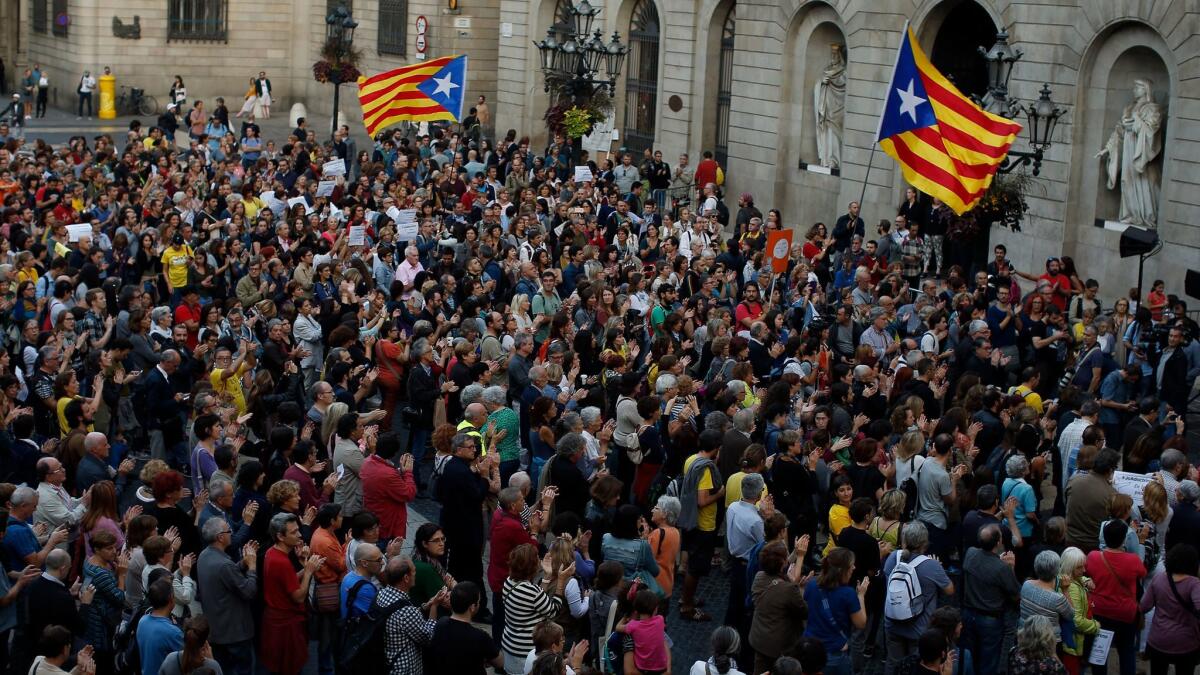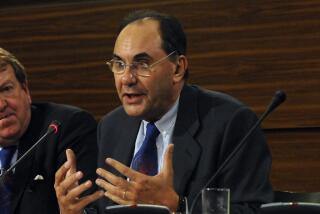Catalonia braces for Spain takeover as two sides remain deadlocked

In a crowd outside Catalonia’s ornate regional headquarters in Barcelona, two men argued fervently. One was for independence from Spain, the other against.
Like others elsewhere in Catalonia, Xaui Nicolau, 41, and Juan Antonio Martinez, 67, argued over whether the northeastern region’s president, Carles Puigdemont, had miscalculated by refusing to renounce secessionist aims.
Puigdemont, in a speech Thursday, ruled out early parliamentary elections — some observers thought holding the elections might help stave off Madrid’s takeover — but not independence.
Now, with the Spanish government poised to strip Catalonia of its regional autonomy and remove Puigdemont as soon as Saturday, Nicolau said a unilateral declaration of independence was “the only option” remaining.
But Martinez, like officials in Madrid, staunchly insisted that Catalonia’s independence drive was illegal. “It’s the way you did it,” he said. “It’s not constitutional.”
Spain’s Senate is to vote Friday on implementing direct rule in Catalonia to quell its independence bid — a step never before taken in Spain’s democratic era by the central government.
After Puigdemont spoke, the regional parliament convened to try to plot a course in the face of Spain’s looming deadline. The talk continued into the night before recessing until Friday morning.
In his televised address, Puigdemont denounced the Madrid government’s plan to seize administrative control of Catalonia — a move that could entail the central government taking over the regional police force and Catalonia’s finances.
“This is an abusive step,” he said. “I do not accept these measures. They are unjust.”
As the hours ticked down, Spain’s deputy prime minister, Soraya Saenz de Santamaria, reiterated that the region’s independence drive would not be allowed to go forward.
“The rule of law has the instruments to cope with such an extraordinarily grave situation,” she told lawmakers in Madrid.
The struggle has pitted prosperous Catalonia, which has limited self-rule, against a central government that has branded the region’s independence drive illegitimate. It is the most serious political confrontation of the country’s nearly 40-year democratic era, which began after dictator Gen. Francisco Franco died in 1975.
Spanish authorities and Puigdemont’s government have been headed for a showdown since regional leaders staged an independence referendum on Oct. 1, defying Spanish court rulings. More than half the electorate stayed away, and police tried to stop the balloting, but the result was overwhelmingly in favor of breaking away.
That set off weeks of bitter back-and-forth exchanges between Madrid and Barcelona, the Catalan capital. Puigdemont sent mixed signals, saying that the vote result was a mandate to declare independence, but stopping short of doing so and then ignoring subsequent Spanish government demands that he clarify his position.
Last week, Spanish Prime Minister Mariano Rajoy declared his intention to impose direct rule on the region using a constitutional provision known as Article 155. That would allow for the ouster of Puigdemont and senior deputies, along with a takeover of the region’s police and finances.
With the Senate set to vote Friday on use of the article, lawmakers in Madrid began debating the issue Thursday. Rajoy’s conservative party controls the chamber and it was expected to back him.
Ander Gil of the opposition Spanish Socialist Workers’ Party suggested there was still time to find a way out of the impasse. “All things can fall back into place,” he told lawmakers. But both sides’ options appeared to be narrowing.
Twitter: @laurakingLAT
Times staff writers Hennessy-Fiske reported from Barcelona and King from Washington. Special correspondent James Badcock in Madrid contributed to this report.
UPDATES:
4:20 p.m.: This article was updated with additional comments about Spain’s government and Catalonia’s push for independence.
12:20 p.m. This article was updated with Spanish government reaction to Puigdemont’s speech, reaction in Barcelona, and Spanish parliament opening debate on imposing direct rule.
9:15 a.m.: This article was updated with the Catalonia president’s speech neither declaring independence nor calling for elections.
This article was originally published at 7:35 a.m.
More to Read
Start your day right
Sign up for Essential California for news, features and recommendations from the L.A. Times and beyond in your inbox six days a week.
You may occasionally receive promotional content from the Los Angeles Times.







